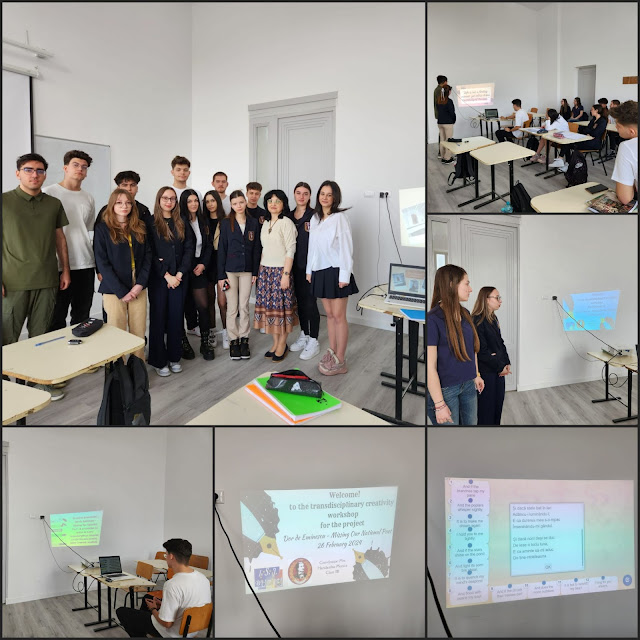Coordonateur:
Friday, 29 March 2024
Wednesday, 27 March 2024
Curricular Integration of the eTwinning project 'Bookfest 2024'
The eTwinning project Bookfest 2024 was integrated into the curriculum from the following perspectives:
I. General competences from the Romanian National Curriculum for
Teaching English as a Foreign Language:
- Receiving oral or written messages in everyday communication situations;
- Creating appropriate oral or written messages in certain communication situations;
- Take part in verbal or written exchanges;
- Transfer and mediation of oral or written messages in various communication situations.
II. Values and Attitudes (from the Romanian National Curriculum):
- Demonstrating flexibility in the exchange of ideas and teamwork in different communication situations
- Awareness of the role of the English language as a means of access to the world cultural heritage;
- Willingness to accept differences and show tolerance through a critical approach to differences and cultural stereotypes
- Developing interest in discovering specific cultural aspects, through receiving a variety of texts in English and by referring to civilization of the Anglo-Saxon cultural space.
III. Key-competences for lifelong learning developed/improved with
the help of the project activities:
- Literacy competence;
- Multilingual competence;
- Digital competence;
- Personal, social and learning to learn competence;
- Civic competence;
- Cultural awareness and expression competence.
- Use of general documentation techniques
- Use of ICT means for documentation and cooperation
- Application of the acquired knowledge for the completion of a project
- Awareness of the social, economic and moral impact of computer use
- Initiative in approaching and solving various tasks, using IT tools
- Availability to communicate using the specific means of an information system
- Understanding the impact of information technologies in society, as well as connections between the Information and Communication Technology and other study subjects
- Demonstrating a creative way of thinking, in structuring and solving work tasks
- Demonstrating willingness to evaluate/self-evaluate practical activities
In our school, we accepted and respected the parents’ decision to allow the pupils to use technology for project-related purposes only while being supervised and monitored by a teacher.
Consequently, we used technology to collaborate synchronously and asynchronously, but also for communication and dissemination purposes, the main tools being: Blogspot.com, Book Creator, Canva, Google forms, Google Meet, Kahoot, Learning apps, Mentimeter, Padlet, PowerPoint, Story Jumper, Youtube, Wakelet, Word Art.
Saturday, 23 March 2024
The creativity workshops for the project "Dor de Eminescu" 2024
The main results of the first year of Erasmus Accreditation for Liceul Teoretic "Radu Vlădescu" Pătârlagele/Erasmus+ learning programme for group activities/Project code: 2023-1-RO01-KA121-SCH-000130265
Wednesday, 6 March 2024
Tuesday, 5 March 2024
The presentation of the students' portfolios created for the project ''Dor de Eminescu - Missing Our National Poet'' (2024)
The presentation of the 27 project portfolios created by the 9th grade students enrolled in the humanities class was one of the main activities of the educational project "Dor de Eminescu/Missing Our National Poet" (2024) currently implemented by Liceul Teoretic "Radu Vlădescu" and coordinated by Mrs. Adelaida Loredana Iorga (teacher of Romanian) and Mrs. Claudia Emilia Frînculeasă (teacher of English).
The presentation of the students' portfolios in a class setting was a valuable opportunity for the project participants to showcase their work, receive feedback and learn from each other's experiences.
After the coordinating teacher briefly explained the purpose of the presentation - sharing accomplishments, highlighting skills and receiving constructive feedback - the students presented their portfolios individually, each benefitting from the same amount of time to ensure fairness and efficiency.
The students were encouraged to provide an overview of their portfolio (including its key sections and showcase the parts that they are particularly proud of or that demonstrate creativity and originality) and highlight any relevant skills, knowledge, or experiences gained through their portfolios.
During the Q&A session, constructive criticism and thoughtful inquiries were facilitated and the students were both respectful and supportive of their peers' efforts.
Peer Feedback, in the form of verbal comments or written post-it notes, was followed by a brief reflection period, which allowed the participants to think about what they have learned from presenting their portfolio and listening to their classmates' presentations.
By following this structured approach, the students could effectively present their portfolios, receive meaningful feedback, and engage in collaborative learning within the classroom setting.







































.jpeg)
.jpeg)
.jpeg)
.jpeg)
.jpeg)
.jpeg)
.jpeg)
.jpeg)
.jpeg)
.jpeg)
.jpeg)
.jpeg)
.jpeg)